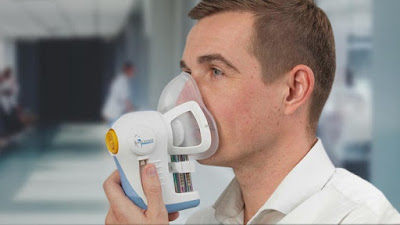According to foreign media New Atlas, the new Breath Biopsy technology will conduct large-scale clinical trials in the UK. The goal of this technology is to collect more than 1,500 different breath samples from cancer patients to assess the extent to which this new respiratory collection device can capture different unique compounds and to try to identify respiratory-based biomarkers specific to different types of cancer
In recent years, we have seen a variety of promising diagnostic breath analyzers, from handheld devices that can detect the flu to more complex systems that allegedly recognize malaria. Most of these devices have not yet entered the market, suggesting that the detection of disease by breathing is more difficult than many scientists think. The new clinical trial hopes to identify a molecule called volatile organic compounds (VOCs) that can be accurately linked to the presence of certain cancers.
The trial is a collaboration between the UK Cancer Research Centre and Owlstone Medical. Owlstone has basically funded the trial to investigate the efficacy of its new Breath Biopsy technology, which hopes to demonstrate a reliable, consistent and cost-effective way to capture VOC samples from patients' breathing.
“Our technology has proven to be very effective in detecting VOCs in the breath, and we are proud to work with the UK Cancer Research Centre because we want to apply it to extremely important areas of early cancer detection in a range of cancers.” Owlstone Medical CEO Billy Boyle explained.
Suppose that when our body's metabolism is destroyed by disease, our cells produce different, unique VOC patterns that can be identified in small amounts in human breathing. If we are able to detect and identify these unique respiratory characteristics, we can diagnose a variety of different conditions from simple respiratory samples.
“Intuitively, lung cancer seems to be the most obvious cancer that can be detected in the breath,” said Cambridge professor Rebecca Fitzgerald, who led the trial. "But because of the way the metabolites circulate in the body, many other volatile molecules in other parts of the body will end up in the breath."
The new trial will investigate patients suspected of having several different cancers: esophageal cancer, stomach cancer, kidney cancer, bladder cancer, prostate cancer, liver cancer or pancreatic cancer. The device took 10 minutes to collect the complete sample, captured and stabilized on a Breath Biopsy Cartridge, and then studied using mass spectrometry to create a unique VOC curve.
In the next two years, the trial will collect the necessary number of samples and the results will be released sometime in 2021.









 Please do sharing our post to your friends Thank you.
Please do sharing our post to your friends Thank you.




No comments:
Kindly post a comment